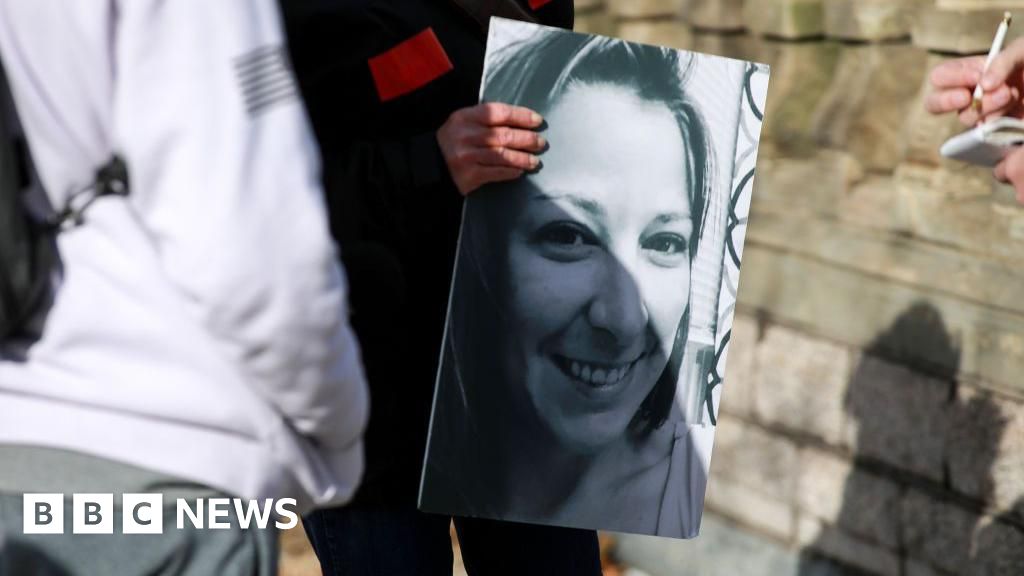ARTICLE AD BOX
9 minutes ago
By Nadine Yousif, BBC News, Winnipeg
A man who killed four indigenous women in the Canadian province of Manitoba has been found guilty of first-degree murder, a judge has ruled.
Lawyers for Jeremy Skibicki, 37, tried to argue that he was not criminally responsible because he was suffering from schizophrenia at the time of the killings.
Prosecutors argued his crimes were racially motivated and said that he had never been diagnosed with the mental illness.
As the judge read his verdict, many in the gallery clapped and some were in tears.
Warning: This story contains details readers my find distressing.
Skibicki, wearing in a grey t-shirt and pants, did not react as King's Bench of Manitoba Chief Justice Glenn Joyal read the summary of his judgement on Thursday morning.
He said the accused failed to demonstrate he was not criminally responsible for the murders.
The verdict comes as a relief to the victims’ families, whohave said the case highlights violence against indigenous women in Canada, and the courtroom was packed full.
With Skibicki facing life behind bars, the focus is now shifting to finding the remains of two of his victims, which are believed to be in a Winnipeg landfill.
A formal search is set to be conducted this autumn.
Skibicki’s victims are Morgan Harris, 39, Marcedes Myran, 26 and Rebecca Contois, 24. The fourth woman who was killed has yet to be identified, and has been given the name Mashkode Bizhiki’ikwe, meaning Buffalo Woman, by indigenous elders.
According to court documents, Skibicki killed the women between March and May of 2022, with Ms Contois believed to be the final victim.
He met at least two at local homeless shelters in Winnipeg, a city of 820,000 in the prairie province.
Crown prosecutors argued he deliberately targeted and exploited “vulnerable” women.
Throughout the weeks-long, judge-only trial, the court heard that Skibicki had assaulted the women, strangled or drowned them and then committed sex acts on them before dismembering their bodies and disposing of them in garbage bins.
The killings went undetected for months, until a man looking for scrap metal in a bin outside Skibicki’s apartment found partial human remains in May 2022 and called police.
“She’s obviously been murdered,” the man said in the 911 call, which was played in court.
Police were able to identify the remains as those of Ms Contois.
More of her remains were discovered at a city-run landfill the following month.
In police interviews shortly after his arrest, Skibicki surprised officers by admitting to killing Ms Contois as well as three other women.
At that point, police had no prior knowledge of the other murders.
His lawyers, however, tried to argue that he was not aware of the severity of his actions due to delusions driven by schizophrenia. They argued he was hearing voices that told him to commit the crimes as part of a mission from god.
Court heard that he had a history of mental illness including depression and borderline personality disorder, though he was never formally diagnosed with schizophrenia.
Prosecutors argued that Skibicki was fully aware of his actions, saying they were “intentional, purposeful and racially motivated”.
They demonstrated this through a mix of DNA forensic evidence, surveillance footage showing Skibicki with the women in their final days, as well as testimony from his ex-wife, who detailed a history of physical abuse.
Had Skibicki been found not criminally responsible for the four murders, it would have been a relative rarity in Canadian law.
According to data from Canada's statistics agency and reported by the Globe and Mail newspaper, between 2000 and 2022, of 8,883,749 criminal cases prosecuted across the country, only 5,178 – or 0.06% – had such verdicts.
The case unearthed deep wounds for Canada’s indigenous community, who have long grappled with a high number of cases of their women going missing or being murdered.
According to an investigation by the Aboriginal Peoples Television Network, Winnipeg - a city near numerous indigenous communities - had the highest number of missing and murdered indigenous women in Canada between 2018 and 2022.
Across Canada, indigenous women are 12 times more likely to be murdered or go missing than other women, according to a 2019 inquiry.
Some indigenous women in the city remain missing, sparking fears from family members that Skibicki had more victims.
The Crown, however, said they do not believe he murdered more women.

 10 months ago
35
10 months ago
35








 English (US) ·
English (US) ·